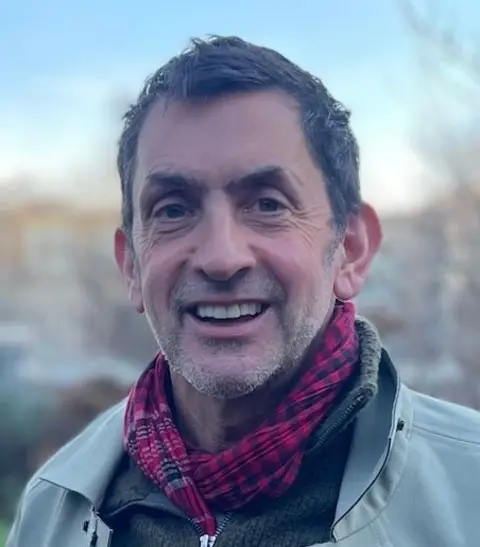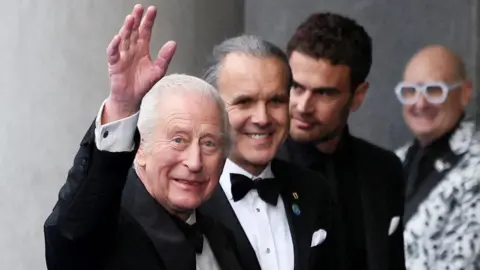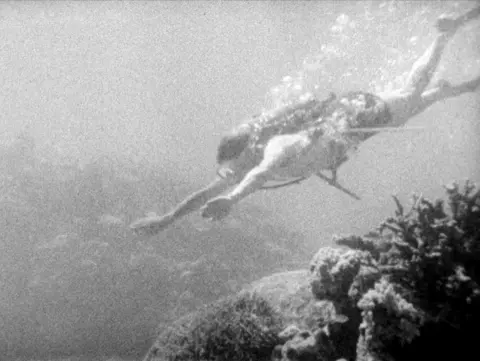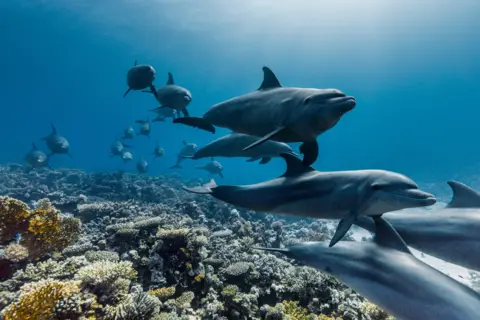Sir David IntoBorough Ocean Film 'Greatest Message he said'


Sir David Participorough launches what he says is one of the most important films in his career when he enters his hundredth year.
He thinks that his new Ocean film film could play a decisive role in savings of biodiversity and the protection of the planet against climate change.
Sir David, who will be 99 years old Thursday, said: “After almost 100 years on the planet, I now understand that the most important place on the land is not on earth, but at sea.”
The ocean is the planet's support system and the greatest ally of humanity against the climate disaster, supports the film. It shows how the oceans of the world are at the crossroads.
 Media in Pennsylvania
Media in PennsylvaniaThe blue carpet was deployed for the first The Royal Festival Hall in London.
The king was present the king, told Sir David that he “could not believe” that his 99th birthday was Thursday.
The pair posed for photos before entering the auditorium for projection.
A crowd of celebrities has also participated, including singer Geri Halliwell-Horner, astronaut Chris Peake, singer James Blunt and the model Cara Delevingne.
Earlier, Prince William attended a “private capacity”, as well as hundreds of school children across the country.
Toby Nowlan, who produced Ocean, says that this new production is not a film typical of attention. “It is not a question of seeing new behaviors of natural history. It is the greatest message he has ever said,” he said.
The film documents how the state of the oceans of the world and our understanding of their functioning changed during the life of Sir David.
 BBC Studios
BBC StudiosSir David remembers his first scuba dive on the great reef of the barrier in 1957: “I was so surprised by the show before me that I forgot – momentarily – breathe.”
Since then, there has been a catastrophic drop in life in the world's oceans. “We are almost short of time,” he warns.
The ocean contains some of the most graphic images of the damage than the lower trawling – a current fishing practice in the world – can do at the seabed. This is a living example of how industrial fishing can empty the life of the world's oceans, says Sir David.
The new images show how the chain that the trawlers drag behind them travels the seabed, forcing the creatures it disturbs in the net behind. They often look for a single species: more than three -quarters of what they capture can be thrown away.
“It is difficult to imagine a more unnecessary way to take fish,” comments Sir David.
The process also releases large quantities of carbon dioxide which contribute to warming our planet, but trawling at the bottom is not only legal, but is actively encouraged by many governments.
Sir David says that the ocean state almost made him lose hope for the future of life on the planet. What prevented him from despair is what he calls the “most remarkable discovery of all” – that the ocean can “recover faster than we have never imagined”.
Sir David says that the history of the whales of the world was a source of enormous optimism for him.
It is estimated that 2.9 million whales were killed by the whale hunting industry in the 20th century only. Scientists said it was the greatest slaughter of any animal in history when measured in terms of total biomass. He pushed almost all the species of whales to the edge of the extinction.
There remains only one percent of the blue whales, recalls Sir David: “I remember thinking that it was everything. There was no return, we had lost the big whales.”
But in 1986, legislators bowed against public pressure and prohibited commercial whale worldwide. The whale population has quickly recovered since then.
One of the directors of the film, Keith Scholey, has been working with Sir David for 44 years. “When I met David for the first time, I was in shorts,” he jokes. It was in 1981, two years after Sir David resigned from his post as director of BBC programs – one of the company's most senior jobs. “He had made a career, and he had left for his neighbor.”
Despite his 99th birthday, Sir David is still remarkably energetic, says Scholey. “Whenever you work with David, you learn something new,” he said. “It's really very fun. But also, David keeps you on your courage, because he is so on his courage and therefore, you know, it's always a very creative process.”
 Silverback and Open Planet Studios
Silverback and Open Planet StudiosSir David's key message in the film Océan is that everything is not lost. Countries have promised to protect a third of the world oceans. He hopes that his new film will encourage leaders to take firm measures on this promise at a United Nations conference next month.
He believes it could be transformational.
“The ocean can bounce back into life,” says Sir David. “If he is left alone, he can not only recover but prosper beyond everything that anyone who has ever seen.”
A healthier ocean ecosystem would also be able to trap more carbon dioxide, helping to protect the world from climate change, according to scientists.
“Before us is a chance to protect our climate, our food, our house,” said Sir David.
While celebrating his 99th birthday this week, he is still fighting to protect the natural world, he worked his life to show us in all his glory.
Ocean will be in cinemas across the country from Thursday.







